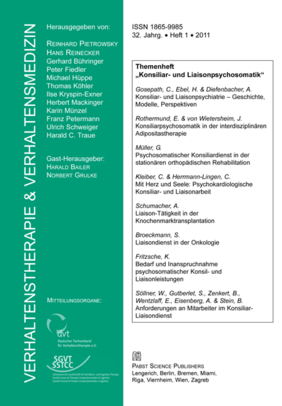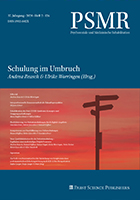Harald Bailer & Norbert Grulke
Editorial: "Konsiliar- und Liaisonpsychosomatik" - eine Einführung
Christoph Gosepath, Hermann Ebel & Albert Diefenbacher
Konsiliar- und Liaisonpsychiatrie - Geschichte, Modelle, Perspektiven
Zusammenfassung | Abstract
Eva Rothermund & Jörn von Wietersheim
Konsiliarpsychosomatik in der interdisziplinären Adipositastherapie
Gottfried Müller
Psychosomatischer Konsiliardienst in der stationären orthopädischen Rehabilitation
Christina Kleiber & Christoph Herrmann-Lingen
Mit Herz und Seele: Psychokardiologische Konsiliar- und Liaisonarbeit
Andrea Schumacher
Liaison-Tätigkeit in der Knochenmarktransplantation
Sylvia Broeckmann
Liaisondienst in der Onkologie
Kurt Fritzsche
Bedarf und Inanspruchnahme psychosomatischer Konsil- und Liaisonleistungen
Zusammenfassung | Abstract
Wolfgang Söllner, Susanne Gutberlet, Barbara Zenkert, Elisabeth Wentzlaff, Andrea Eisenberg & Barbara Stein
Anforderungen an Mitarbeiter im Konsiliar-Liaisondienst - Ergebnisse einer Auswertung von Leitlinien und Umfragen unter Mitarbeitern im Konsiliar-/Liaisondienst
Zusammenfassung | Abstract
Highlights der Psychotherapieforschung
Kognitive Verhaltenstherapie bei älteren Menschen mit Depression
Psychosoziale Therapie bei Depression nach Schlaganfall
Konsiliar- und Liaisonpsychiatrie - Geschichte, Modelle, Perspektiven
Christoph Gosepath, Hermann Ebel & Albert Diefenbacher
Zusammenfassung: Die historische Entwicklung der Konsiliar- und Liaison-Psychiatrie/-Psychosomatik wird skizziert. Drei Modelle - die reine Konsiliarpsychiatrie, die Liaisonpsychiatrie und integrative Modelle - werden vorgestellt, ebenfalls die Indikationsgebiete. Abschließend folgt ein Problemausblick am Beispiel der konsiliarpsychiatrischen Versorgung in Berlin-Lichtenberg.
Schlüsselwörter: Konsiliarpsychiatrie, Liaisonpsychiatrie, Situation in Deutschland, Modelle der Konsiliarpsychiatrie
History of consultation-liaison psychiatry
Abstract: The historical development of CL-Psychiatry/-Psychosomatics has been sketched. Three models - the pure consultation psychiatry, the liaison psychiatry and models of integrating therapy - are presented, as well as the indications. At last an outlook on problems is illustrated by the example of CL-Psychiatry in Berlin-Lichtenberg.
Key words: Consultation Psychiatry, Liaison Psychiatry, German situation, Models of CL-Psychiatry
Dr. Christoph Gosepath, M.A.
Ev. Krankenhaus Königin Elisabeth Herzberge
Herbergstr. 79
D-10365 Berlin
E-Mail: c.gosepath@keh-berlin.de
Bedarf und Inanspruchnahme psychosomatischer Konsil- und Liaisonleistungen
Kurt Fritzsche
Zusammenfassung: Fragestellung: Wie läuft der Entscheidungsprozess vom Erkennen psychosozialer Belastungen, über die Diagnose bis zur Realisierung einer psychotherapeutischen Intervention im Rahmen des psychosomatischen Konsil- und Liaisondienstes.
Methodik: Bei n = 392 Patienten wurden bei Aufnahme in die Klinik die psychosozialen Belastungen durch psychometrische Fragebögen erfasst, der psychotherapeutische Behandlungsbedarf eingeschätzt und die tatsächliche Inanspruchnahme des psychosomatischen Liaisondienstes dokumentiert.
Ergebnisse: 44 % der untersuchten Patienten hatten mindestens eine behandlungsbedürftige psychische Störung nach ICD-10. In der Experteneinschätzung wurde bei 41 % ein psychotherapeutischer Behandlungsbedarf gesehen, während auf Patientenseite 54 % für mindestens eines der Therapieangebote motiviert waren. 35 % der Patienten wurden tatsächlich psychotherapeutisch behandelt. Während beim expertengeschätzten Behandlungsbedarf psychische Belastungen signifikante Prädiktoren waren, spielten sie bei der Indikationsstellung und Inanspruchnahme von Psychotherapie keine genuine Rolle mehr.
Schlussfolgerungen: Psychotherapeutische Interventionen im Liaisondienst erfolgen nicht immer zielgerichtet und indikationsbezogen.
Schlüsselwörter: Psychosomatischer Liaisondienst, körperlich Kranke, psychosoziale Belastungen, Psychotherapie
Need and use of psychosomatic liaison services
Abstract: Aim: How does the decision-making process between recognition of psychosocial stress, its diagnosis and the realization of psychotherapeutic intervention work within the framework of psychosomatic consulting and liaison service.
Method: Psychosocial stress was recorded using a psychometric questionnaire in n=392 patients on admission to hospital, the need for psychotherapeutic treatment was estimated and the actual realization of psychosomatic liaison service was documented.
Results: 44 % of the examined patients presented with at least one mental disorder requiring treatment according to ICD-10 criteria. In the estimation of the expert, a need for psychotherapeutic treatment was present in 41 %, while 54 % of the patients themselves were motivated for at least one of the psychotherapeutic treatments offered. 35 % of the patients actually received psychotherapeutic treatment. While mental disorders and emotional distress were significant predictors in the need for treatment as rated by experts, they played no genuine role in determining the indication and in the use of psychotherapy.
Conclusions: Psychotherapeutic interventions in the liaison service are not always targeted and related to the indication.
Key words: Psychosocial distress, psychotherapy, psychosomatic liaison service, medically-ill patients
Prof. Dr. med. Kurt Fritzsche
Abteilung für Psychosomatische
Medizin und Psychotherapie am
Universitätsklinikum Freiburg
Hauptstr. 8
D-79104 Freiburg
E-Mail: kurt.fritzsche@uniklinik-freiburg.de
Anforderungen an Mitarbeiter im Konsiliar-Liaisondienst - Ergebnisse einer Auswertung von Leitlinien und Umfragen unter Mitarbeitern im Konsiliar-/Liaisondienst
Wolfgang Söllner, Susanne Gutberlet, Barbara Zenkert, Elisabeth Wentzlaff, Andrea Eisenberg & Barbara Stein
Zusammenfassung: Die Tätigkeit im Konsiliar-/Liaisondienst (CL-Dienst) erfordert eine spezielle Qualifikation. Sowohl das medizinische Umfeld als auch die Arbeit mit körperlich kranken und oft existentiell bedrohten Patienten machen eine Anpassung der Behandlungsmethoden notwendig. Auf der Basis einer Sichtung vorliegender europäischer, amerikanischer und deutscher Leitlinien und Umfragen unter Mitarbeitern im CL-Dienst in Europa, Deutschland und Österreich werden spezielle Anforderungen an Kenntnisse, Fähigkeiten und Haltungen für diese Tätigkeit identifiziert. Adaptionen der psychotherapeutischen Tätigkeit und teamzentrierte Interventionen werden beschrieben. Mitarbeiter im CL-Dienst gaben in Umfragen an, dass sie eine breite klinische Erfahrung, Fertigkeiten in Kurzpsychotherapie und Krisenintervention, allgemeine medizinische Kenntnisse, praktische Erfahrungen im medizinischen Feld und einen intensiven fachlichen Austausch in einem speziellen CL-Team als besonders wichtig für die Tätigkeit im CL-Dienst ansehen. Ausreichende Supervision, Selbsterfahrung, gute Beziehungen im Team und ausreichender Ausgleich im Privatleben werden als wesentliche Faktoren für die Arbeitszufriedenheit genannt.
Schlüsselwörter: Konsiliardienst, Liaisondienst, Aufgaben, Fortbildung, Weiterbildung
Job profile and training in consultation-liaison psychiatry and psychosomatics
Abstract: Consultation-liaison (C-L) psychiatrists and specialists in Psychosomatic Medicine need special qualifications. Working in the medical field with medically ill patients who often suffer existential threat requires adaptions of treatment methods. Based on a review of practice guidelines and a survey among C-L psychiatrists, psychosomaticists, and psychologists, needs for special knowledge, skills and attitudes of consultants are identified. Adaptions of psychotherapeutic techniques and team-centred interventions are described. Surveys among C-L psychiatrists, psychosomaticists, and psychologists showed the following factors being helpful for the work in C-L: broad clinical experience, skills in short-therm psychotherapy and crisis intervention; knowledge and practical experience in the field of general medicine; discussion of difficult cases in a specific C-L team. Consultants regarded sufficient supervision, self-experience, good relations in the professional team, and sufficient "work-life-balance important factors for satisfaction with work.
Key words: consultation-liaison psychiatry, psychosomatic medicine, training, education
Prof. Dr. med. Wolfgang Söllner
Klinik für Psychosomatische Medizin und Psychotherapie
Klinikum Nürnberg
Prof.-Ernst-Nathan-Str. 1
D-90419 Nürnberg
E-Mail: wolfgang.soellner@klinikum-nuernberg.de























